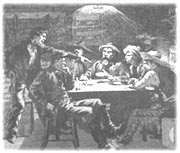"Upon this hint I spake." - Shakespeare.
"What could I more?
I warn'd thee, I admonish'd thee, foretold the danger, and the lurking enemy That lay in wait." - Milton.
"Euchre and Life Own their losses and gains in ephemeral strife. 'Play alone,' when you hold the 'good cards' in the pack;
'Assist,' with the Ace, or the King and a Jack.
'Pass,' holding 'both Bowers' - on refusal to take,
You can 'make' it 'the next' and can 'play what you make;'
Look out for the 'bridges,' and cross if you choose, But with Euchre and Life, play to win, not to lose."
- Pettes.

